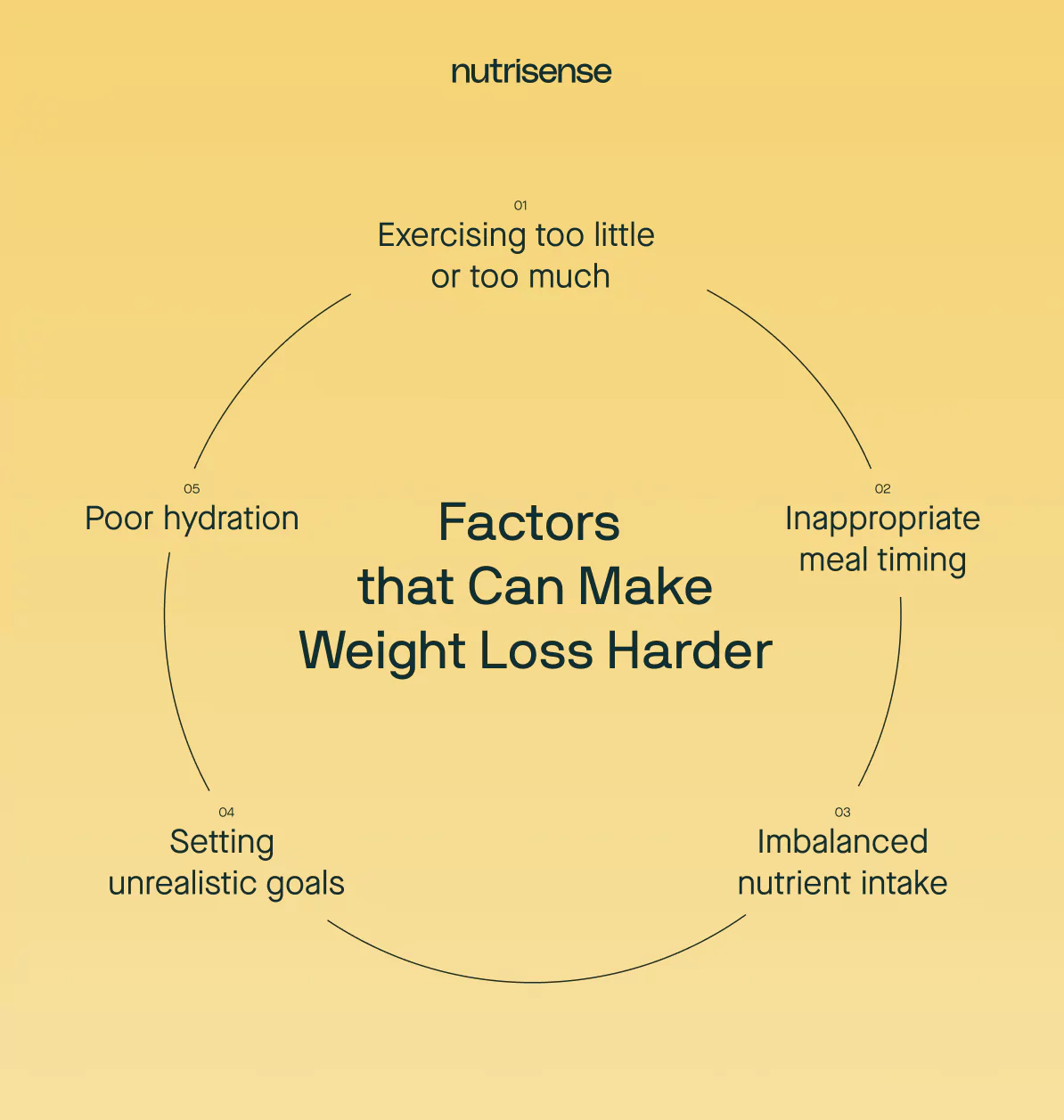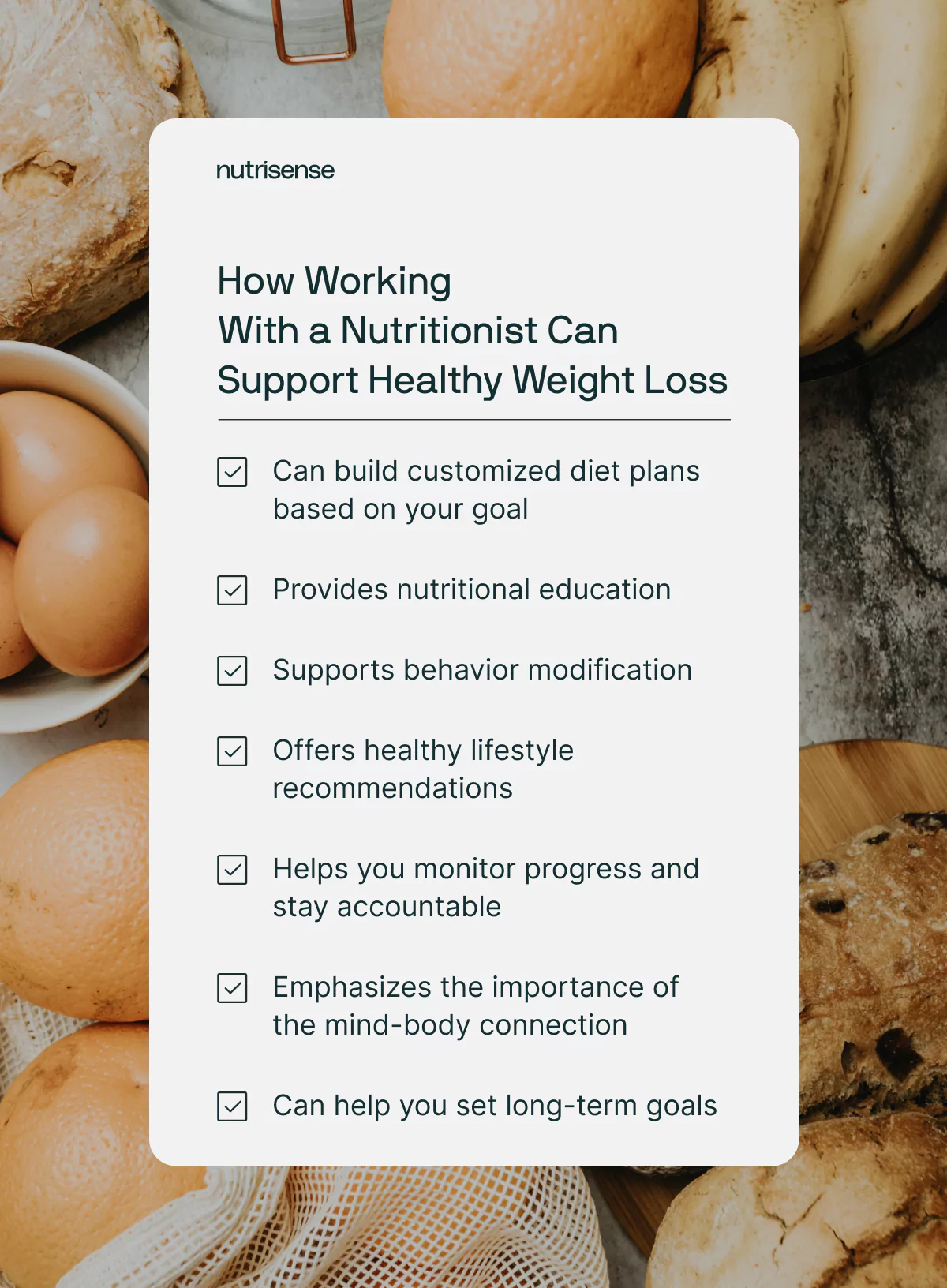Why You Should Work with a Nutritionist for Weight Loss

Key Takeaways
“How to lose weight” is one of the most common Google searches—and for many, it feels like an unsolvable puzzle. Miracle weight loss programs claim to have the answer but often have unwanted side effects or don't work in the long run.
The truth is healthy weight loss looks different for everyone. A one-size-fits-all approach doesn’t account for individual differences in metabolism, lifestyle, or health history. So, if you're struggling with weight loss, working with a registered dietitian or nutritionist specializing in weight loss and metabolic health is vital.
What does a nutritionist do for weight loss? Read on to learn how expert guidance and a personalized action plan can help you overcome weight loss challenges and set you up for long-term success.
Challenges of Losing Weight Without Help

Without personalized help and coaching, it’s easy to feel lost in a sea of conflicting advice on healthy eating. Here are just some of the many potential weight loss challenges a registered dietitian nutritionist or certified nutrition specialist can help you navigate and overcome.
1) Imbalanced Nutrient and Calorie Intake
Whether it’s overeating or undereating, the result can often be the same. These eating patterns can result in undesired weight gain, increased cravings, and difficulty maintaining weight.
How a Nutritionist Helps
A qualified nutritionist can help you look closely at your diet and nutritional needs. From there, they can help you construct a personalized meal plan that optimally fulfills your dietary needs while also conforming to your respective budget, preferences and lifestyle.
2) Conflicting Advice & Fad Diets
The internet is flooded with conflicting advice about weight loss. However, trendy, quick-fix solutions lead to confusion and unhealthy eating habits. While some fad diets or generic advice may lead to short-term weight loss, they often fail to deliver sustainable results and can even harm your metabolism or relationship with food.
How a Nutritionist Helps
When you work 1:1 with a registered dietitian or nutritionist, you learn what works for your body. After all, even if you get bits of advice that are technically right, how do you know that they’re right for your specific needs?
Weight loss is more complicated than it seems, and wading through all the information can be difficult. A qualified professional can help you cut through the noise to find a science-backed approach that works for you. They use evidence-based methods to create a personalized nutrition plan tailored to your metabolism, preferences, and health history.
3) Inappropriate Meal Timing

When it comes to weight loss and weight management, it’s not just what you eat—it’s also when you eat. Research shows that meal timing, specifically late-night eating, can have a powerful impact on body weight. This can be an issue for people who work night shifts or those with other lifestyle factors that may make it difficult to determine optimal meal timing.
How a Nutritionist Helps
Working with a nutritionist can eliminate a lot of the guesswork and help you determine the best times, portion sizes, and frequency for your daily meals.
As with other areas of health, this can vary widely from person to person. A nutritionist can help you understand what best suits your unique physiology based on your unique routine or lifestyle by adding sustainable, timely action plans to help you achieve your weight goals.
4) Exercising Too Little or Too Much
When it comes to improving overall health, it’s all about balance. Physical activity, too, requires a similar degree of balance to impart its many health benefits. On the one hand, a sedentary lifestyle has a high correlation with weight gain, among other adverse health risks; at the same time, overexercising can lead to fatigue, glucose intolerance, and even injury.
How a Nutritionist Helps
A nutritionist can help you find that sweet spot between too little and too much to form healthy habits that last. By working with you closely, they can help you ensure that you’re doing enough to achieve the results you desire while making sure that you’re properly fueling your body for exercise, fueling your body for all types of exercise, from HIIT workouts to power walking.
5) Hormonal Imbalances & Metabolic Issues
For many, weight gain is linked to underlying hormonal imbalances or metabolic conditions like insulin resistance, polycystic ovary syndrome (PCOS), or thyroid disorders. You may be stuck in a weight loss plateau without addressing the root causes.
How a Nutritionist Helps
Studies have shown that professional dietary support can improve weight loss outcomes and metabolic health. A dietitian, particularly one trained in metabolic health like the glucose-certified experts at Nutrisense, can analyze your body’s data, lab results, and overall health, work with you to adjust your nutrition and suggest lifestyle changes to target these imbalances, helping your body function optimally.
6) Setting Unrealistic Weight Loss Goals
Losing weight takes time! If you’re not setting realistic goals to do this, you could also end up with eating disorders or extreme calorie restriction cycles. Drastically reducing calories if your body doesn’t need them, especially without expert guidance, can slow your metabolism, lead to muscle loss, and trigger rebound weight gain when regular eating resumes. Additionally, undernourishment can exacerbate health conditions and cause fatigue, irritability, and nutrient deficiencies.
How a Nutritionist Helps
A nutritionist can help you determine weight loss goals that are realistic, achievable, and, above all, healthy and safe. They understand that you have habits, preferences, and attitudes that are entirely unique to you—and can help you devise a plan to meet your goals and hold you accountable to reaching them.
7) Misunderstanding How Medications like GLP-1s Support Weight Loss
Many people are prescribed GLP-1 medications (like Ozempic or Wegovy), and for some, they’re the missing tool in their toolkit to help kickstart their weight loss journey.
GLP-1s help regulate appetite and blood sugar but are most effective when combined with tailored nutrition strategies. Good guidance from a weight loss expert will also help you manage any side effects you may experience with these drugs.
How a Nutritionist Helps
Nutritionists cannot prescribe GLP-1 medications, but credentialed specialists (like RDNs, CNs, and so on) can be invaluable on your GLP-1 journey; some also offer specific medical nutrition therapy.
Working alongside your healthcare provider, they can optimize your nutrition and help with lifestyle interventions to manage gastrointestinal and other side effects. They will also guide you toward making the right food choices to facilitate fat loss and prevent muscle loss and create a personalized nutrition plan that enhances the medication’s benefits.
Strategies Nutritionists Use to Help People Lose Weight

Losing weight with the help of a nutritionist involves a certain amount of trial and error—it’s a dynamic process that responds to feedback from your body.
For example, Nutrisense’s team of registered dietitians and nutritionists can also leverage your lab tests, health conditions, medical history, and data from health tech like continuous glucose monitoring (CGM) to understand your unique metabolic responses. This ensures that your weight loss strategy is grounded in real data. Research consistently shows that individualized care results in better long-term outcomes for weight management.
Here are some specific strategies your nutritionist may implement when working with you to help you on your weight loss journey.
Tailor Nutrition & Diet Plans to Your Body’s Needs
From your dietary needs to specific food preferences, a nutritionist will work with you to create a nutritional plan that helps you look and feel your best.
They’ll be able to help you find your carbohydrate tolerance, incorporate lean protein and healthy fat sources into your diet, and ensure you’re getting all the other essential nutrients you need in a healthy diet.
Provide Nutritional Education

Nutritionists can also educate you on the “why” behind the foods you eat and advise you on which types of foods can help push you towards your goals and which ones will likely hold you back. With nutrition counseling, you’ll receive guidance to help you create a plan to support healthy blood sugar levels while giving you the tools you need to make better choices. Your nutritionist can help with everything from the ideal macro and micronutrients to easy meal prep. They’ll even be able to go over supplement reviews and follow your progress to check that everything works for your body as you go along.
Address the Root Causes of Weight Gain
Many people experience weight gain due to underlying health conditions, and simply reducing calories won't address them. A weight loss expert can help you listen to what your body is trying to tell you. They then create strategies that work with your body’s unique biology, helping to correct metabolic dysfunction while promoting weight loss.
Support Behavior Modification
Changing an old habit or instilling a new one is sometimes harder than it seems. That’s where a nutritionist comes in. They’re experts at helping people improve their lifestyles to suit their needs and preferences.
Making healthy changes is essential to any weight loss journey, but every journey moves at its own pace. Your nutritionist understands this, and they will work with you on your own terms to help you realize your goals.
Offer Balanced Guidance—Without Restrictions
Unlike restrictive diets that demonize foods, a registered dietitian or nutritionist who works with your body will not restrict your diet; they’ll help you learn how to expand it while still meeting your goals. At Nutrisense, our health team refers to this as their diet-agnostic approach, which focuses on balance and moderation rather than strict rules.
Nutritionists with this focus work to create a positive, sustainable relationship with food so you don’t feel deprived or restricted, which is one of the most common reasons diets fail.
Offer Lifestyle Recommendations

You’d be surprised how small changes can transform your life. This is the nutritionist’s bread and butter—the little ripples you can make today that will become waves further down the road.
A good nutritionist will also be hands-on! By working with you through life’s seasons, they’ll meet you where you are on your path to healthy weight loss.
Help Monitor Progress & Analyze Results
Helping you get started is just one aspect of what a nutritionist does. But by engaging with your progress along the way, your nutritionist can hold you accountable and ensure that you’re on the optimal path to realizing your goals. They can help you tweak your routine to keep you motivated and moving forward smoothly.
Emphasize the Mind-Body Connection
Weight loss is as much a mental journey as a physical one. Your mental health is just as important as the habits you’re implementing. Pursuing a goal and reaping the fruits of that pursuit have as much of an inward dimension as they do an external one. Your nutritionist is there to help you with both sides of the mind-body coin.
Help Set Long-Term Goals

For a nutritionist, the goal is not simply to help you lose a certain amount of weight in a specific timeframe but to help you cultivate the knowledge and tools necessary to thrive in the long term.
While short-term goals can provide an invaluable feeling of accomplishment, true wellness is an ongoing journey that your nutritionist wants to ensure you’re amply equipped for.
Find the right Nutrisense programto turn insight into progress.
Meet Your Weight Loss Goals with Nutrisense
Ready to achieve lasting weight loss? At Nutrisense, you can pick from various programs and solutions to help you reach your goals.
Plus, you can work 1:1 with our registered dietitians and nutritionists for personalized support that goes beyond quick fixes. Whether you want to manage cravings, improve energy, lose weight, or tackle metabolic health issues, our experts use your body’s unique data to create a tailored plan. With most members paying $0 out-of-pocket for insurance-covered video calls with a nutritionist, reaching your weight loss goals has never been more accessible.
Start with our quiz to see how Nutrisense can support your health.
Go Beyond Glucose Data with Nutrisense
Your glucose can significantly impact how your body feels and functions. That’s why stable levels are an important factor in supporting overall wellbeing. But viewing glucose isn't enough. Nutrisense, you’ll be able to learn how to use your body's data to make informed lifestyle choices that support healthy living.
One-to-one coaching
Sign up to access insurance-covered video calls to work with a glucose expert: a personal registered dietitian or certified nutritionist who will help tailor your lifestyle and diet to your goals.
Monitor and measure what matters
With the Nutrisense CGM Program, you can monitor your glucose with health tech like glucose biosensors and continuous glucose monitor (CGM)s, and analyze the trends over time with the Nutrisense App. This will help you make the most informed choices about the foods you consume and their impact on your health.
Find your best fit
Ready to take the first step? Start with our quiz to find the right Nutrisense program to help you take control.

Catherine is a Registered Dietitian Nutritionist and Nutrition Manager at Nutrisense, with a Masters in Nutrition Education from Columbia University. She completed her undergrad work at the University of Pennsylvania. Catherine has counseled thousands of clients on their glucose scores, reviewing over 750,000 hours of glucose data and recorded meals in the process while recommending nutritional adjustments to improve metabolic health.




